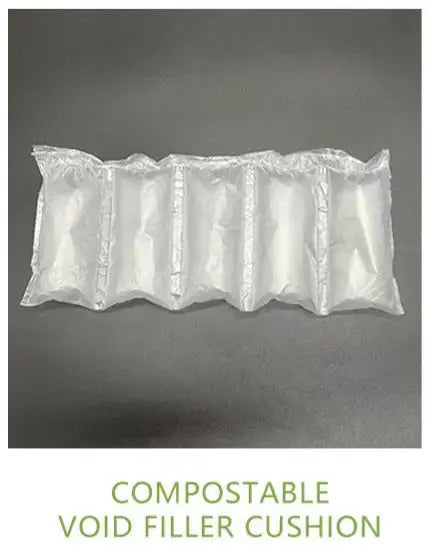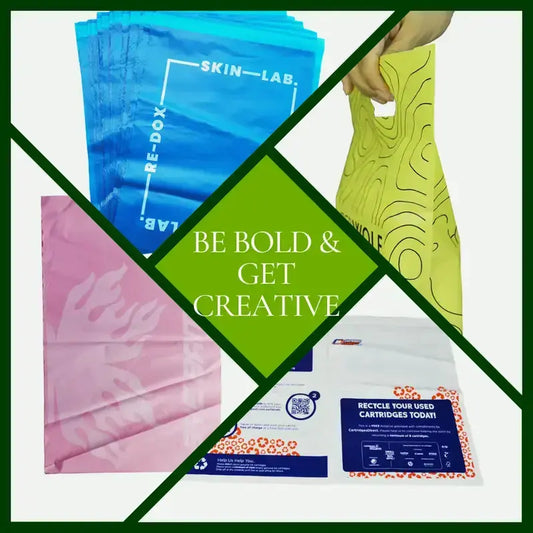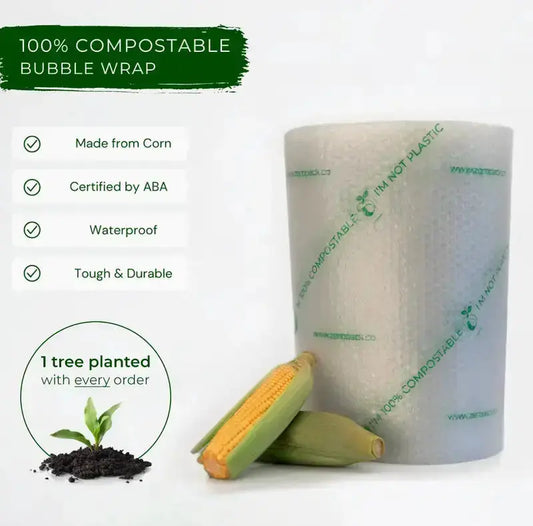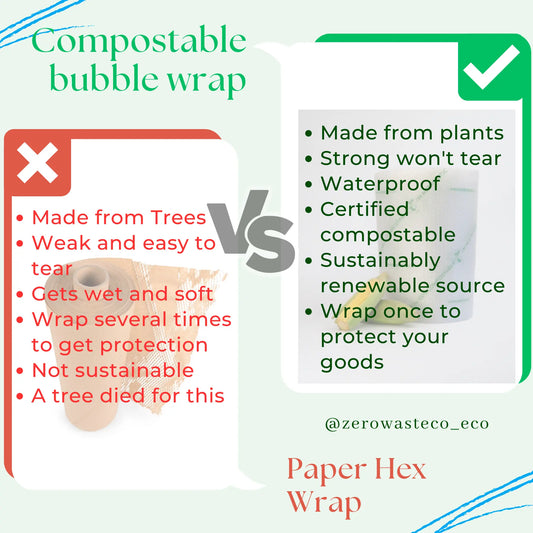Breaking Down the Benefits: Unveiling the Potential of Compostable mailers
Looking for an eco-friendly alternative to traditional mailers? Look no further – compostable mailers are here to revolutionize the packaging industry. These innovative packaging solutions offer a host of benefits that go beyond sustainability.
Compostable mailers are made from plant-based materials that break down naturally in composting systems. This means that they not only reduce waste but also contribute to the creation of nutrient-rich soil. By choosing compostable mailers, you can demonstrate your commitment to the environment and make a positive impact on the planet.
But the benefits don't stop there. Compostable mailers are also durable, lightweight, and moisture-resistant, ensuring that your products are protected during transit. Additionally, they can be customized and branded to create a memorable unboxing experience for your customers.
With the increasing demand for sustainable packaging solutions, incorporating compostable mailers into your business strategy is a wise move. Join the movement towards a greener future and unlock the potential of Compostable mailers for your brand today.
The environmental impact of traditional mailers
Traditional mailers, often made from plastic materials, have become a staple in the shipping and packaging industry. However, the environmental consequences of using such materials are significant. These mailers can take hundreds of years to decompose in landfills, contributing to the growing problem of plastic waste. As consumers increasingly recognize the urgency of the climate crisis, the demand for sustainable alternatives has surged. The stark reality is that while traditional mailers serve their purpose in the short term, their long-term environmental footprint is detrimental to our planet.
Moreover, the production of conventional plastic mailers is energy-intensive and contributes to greenhouse gas emissions. The extraction of fossil fuels, the primary component in plastic production, not only depletes finite resources but also pollutes the air and water. Additionally, many traditional mailers are not recyclable, which means they end up in landfills or oceans, harming wildlife and ecosystems. The plastic waste crisis is a pressing issue, with millions of tons of plastic entering the oceans each year, affecting marine life and disrupting natural habitats.
In contrast, the increasing awareness of these environmental impacts has led businesses and consumers to seek out sustainable alternatives. The adoption of eco-friendly packaging options, such as compostable mailers, has become a critical step in mitigating the negative effects of traditional mailers. By understanding the environmental impact of their packaging choices, companies can align their practices with a more sustainable future, benefiting both the planet and their brand image.
Compostable mailers are an innovative packaging solution designed to break down naturally in composting environments. Unlike traditional plastic mailers, which can persist in the environment for centuries, compostable options are made from plant-based materials that decompose into organic matter. These materials can include substances like cornstarch, vegetable oils, and other biodegradable polymers. The key advantage of compostable mailers is their ability to return to the earth, enriching the soil rather than contributing to landfill waste.
The process of composting involves the natural breakdown of organic materials by microorganisms, resulting in nutrient-rich compost that can be used to enhance soil health. For a mailer to be classified as compostable, it must meet specific criteria, such as breaking down within a certain time frame and not leaving harmful residues. Many compostable mailers are also certified by organizations that ensure they meet rigorous environmental standards, providing peace of mind for consumers and businesses alike.
In addition to their environmental benefits, compostable mailers are designed to be functional and durable. They can withstand the rigors of shipping and handling, making them a practical choice for businesses looking to reduce their ecological footprint while ensuring product protection. With customization options available, brands can create a memorable unboxing experience for their customers, all while promoting sustainability.
The advantages of incorporating compostable mailers into a business’s packaging strategy are multifaceted. First and foremost, they significantly reduce landfill waste. By opting for compostable materials, businesses can contribute to a circular economy where products are designed with their end-of-life in mind. Instead of contributing to the growing mountains of plastic waste, compostable mailers return to the earth, supporting soil health and sustainability.
Additionally, compostable mailers align with consumer preferences, particularly among environmentally conscious shoppers. Research indicates that a growing number of consumers prefer brands that prioritize sustainability. By offering compostable packaging, businesses can enhance their brand image and attract a loyal customer base that values eco-friendly practices. This commitment to sustainability not only differentiates a brand from competitors but also fosters positive customer relationships.
Furthermore, compostable mailers are versatile and can be tailored to various business needs. They come in different sizes, styles, and designs, allowing brands to choose options that best fit their products. Many compostable mailers are also lightweight and moisture-resistant, ensuring that items remain intact during transit. This combination of functionality and eco-friendliness makes compostable mailers an excellent choice for businesses looking to make a positive impact on the environment without sacrificing quality.
Compostable mailer statistics and case studies
As the movement towards sustainable packaging gains momentum, several statistics highlight the growing importance of compostable mailers. According to a report by Grand View Research, the global biodegradable packaging market is expected to reach $500 billion by 2027, with compostable packaging making up a significant portion of this growth. This surge in demand indicates a shift towards more sustainable practices across various industries, including e-commerce and retail.
Case studies of companies that have successfully implemented compostable mailers provide further insight into their benefits. For instance, a popular online clothing retailer reported a significant increase in customer satisfaction after transitioning to compostable packaging. Not only did customers appreciate the eco-friendly initiative, but the brand also saw a reduction in packaging waste and overall shipping costs. This example illustrates how adopting sustainable practices can positively impact a company's bottom line while enhancing brand loyalty.
Moreover, studies show that consumers are willing to pay a premium for products packaged in sustainable materials. A survey conducted by Nielsen found that 73% of global consumers are willing to change their consumption habits to reduce their environmental impact. This statistic underscores the importance of offering compostable mailers as part of a broader sustainability strategy, enabling businesses to meet consumer expectations and drive revenue growth.
Choosing the right compostable mailer for your business
Selecting the appropriate compostable mailer for your business involves considering several factors to ensure that the packaging meets both environmental standards and practical needs. First, assess the materials used in the mailer. Look for products made from certified compostable materials, such as those recognized by organizations like the ABA, ASTM International or the Biodegradable Products Institute (BPI). These certifications ensure that the mailers will break down effectively in composting environments without leaving harmful residues.
Next, evaluate the size and style of the mailer. Choosing the right dimensions is crucial for minimizing wasted space during shipping and reducing shipping costs. Many suppliers offer a range of sizes and styles, from padded mailers to flat envelopes, allowing businesses to select options that best fit their products. Additionally, consider the aesthetic appeal of the mailers; custom branding and design can enhance customer experience and promote brand identity while emphasizing your commitment to sustainability.
Lastly, consider the supplier’s commitment to sustainability. Partnering with a supplier that shares your values can strengthen your brand’s eco-friendly message. Look for suppliers that prioritize ethical practices, such as using renewable energy sources in their manufacturing processes and implementing waste-reduction strategies. By choosing a reputable supplier, you can ensure that your compostable mailers not only meet your business needs but also contribute positively to the environment.
Understanding how to properly dispose of compostable mailers is essential for maximizing their environmental benefits. The first step is to educate customers about the disposal process. Compostable mailers are designed to be composted in commercial composting facilities, which provide the necessary conditions for rapid decomposition. Businesses can include clear disposal instructions on the mailers themselves or in accompanying materials, guiding consumers on how to dispose of them correctly.
For those who may not have access to commercial composting, it's important to inform customers that home composting is also an option, although it may take longer for the mailers to break down. Providing tips on how to create an effective home composting environment can empower customers to take action. Encouraging consumers to compost mailers at home not only reduces waste but also fosters a greater sense of environmental responsibility.
Additionally, businesses can collaborate with local composting facilities to create drop-off programs for used mailers. This initiative can help facilitate the proper disposal of compostable mailers and encourage community participation in sustainable practices. By taking proactive steps to ensure the correct disposal of compostable mailers, businesses can further enhance their sustainability efforts and promote a circular economy.
While the environmental benefits of compostable mailers are clear, many businesses may wonder about the cost implications of switching from traditional packaging. Initially, compostable mailers may have a higher upfront cost compared to conventional plastic options. However, it's important to consider the long-term savings associated with reduced waste disposal fees and the potential for increased customer loyalty and sales.
Investing in compostable mailers can also enhance a brand's reputation, leading to increased market share among environmentally conscious consumers. Research shows that brands committed to sustainability can command a premium price point, allowing businesses to offset the initial investment in compostable packaging. Furthermore, as the demand for sustainable products grows, more suppliers are entering the market, leading to increased competition and potentially lower prices for compostable mailers over time.
Ultimately, businesses should weigh the costs against the benefits of adopting compostable mailers. The long-term positive impact on the environment, coupled with the potential for enhanced brand loyalty and customer satisfaction, makes compostable mailers a wise investment. By choosing to prioritize sustainability, businesses not only contribute to a healthier planet but also position themselves for future growth in an increasingly eco-conscious market.
When comparing compostable mailers to traditional plastic options, the differences become starkly apparent. The most significant distinction lies in their environmental impact. Traditional mailers contribute to the plastic waste crisis by persisting in landfills for centuries, whereas compostable mailers break down naturally, enriching soil and supporting a circular economy. This fundamental difference is a key consideration for businesses aiming to reduce their ecological footprint and align with consumer preferences for sustainable practices.
In terms of functionality, compostable mailers are designed to be durable and moisture-resistant, similar to their plastic counterparts. Many compostable options can withstand the rigors of shipping without compromising product integrity. Additionally, they can be customized to reflect a brand's identity, providing the opportunity for eye-catching designs that resonate with consumers. This functionality ensures that businesses do not have to sacrifice quality or aesthetics when transitioning to compostable packaging.
Cost is another factor to consider when comparing these two packaging options. While traditional mailers may offer lower upfront costs, businesses must account for the environmental and social costs associated with plastic waste. In contrast, compostable mailers may have a higher initial investment, but they align with growing consumer expectations for sustainability, potentially leading to increased sales and customer loyalty. Ultimately, the choice between compostable and traditional mailers should be guided by a company's values, goals, and commitment to sustainability.
Conclusion: Embracing sustainability with compostable mailers
As the demand for sustainable packaging solutions continues to rise, compostable mailers present a compelling option for businesses seeking to reduce their environmental impact. By understanding the drawbacks of traditional mailers and exploring the benefits of compostable alternatives, companies can make informed decisions that align with their values and the expectations of their customers. Compostable mailers not only contribute to waste reduction but also enhance brand image and customer loyalty.
Embracing compostable mailers is more than just a trend; it's a commitment to a sustainable future. By choosing packaging that breaks down naturally, businesses can play a significant role in mitigating the plastic waste crisis and promoting a circular economy. Furthermore, as consumers increasingly prioritize sustainability in their purchasing decisions, adopting eco-friendly practices can lead to long-term growth and success.
In conclusion, the transition to compostable mailers represents a crucial step towards a greener future. By investing in sustainable packaging solutions, businesses can make a positive impact on the environment while appealing to a growing base of eco-conscious consumers. The potential of compostable mailers is vast, and by integrating them into packaging strategies, companies can contribute to a healthier planet for generations to come.

















0 comments